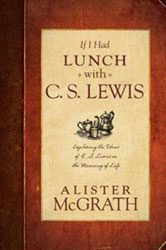 Alister McGrath’s new book If I Had Lunch With C.S. Lewis walks the reader through imaginary sittings with Lewis where he would mentor his listeners through major life issues and questions. One of those life issues is hidden in plain sight.
Alister McGrath’s new book If I Had Lunch With C.S. Lewis walks the reader through imaginary sittings with Lewis where he would mentor his listeners through major life issues and questions. One of those life issues is hidden in plain sight.
We’re so used to seeing Lewis as a Christian apologist and storyteller that we forget that he was a professor – at both Oxford and Cambridge. And Lewis had much to say about the importance of what he did, about education. Above all else, an education made better people. He had no time for learning that amounted to nothing more than warehousing information. Learning invariably involved ideas, ideas pressed one into thinking and thinking built, shaped and changed lives. Education that fell short of this produced “men without chests”, people incompetent to engage reality, to know right from wrong, the good from the bad.
He would be a tough nut in modern conversations on education where almost all the talk centers around what kind of a job one can find after graduation. Lewis might counter that anyone who saw their education only as a means to a job wouldn’t be worth hiring. He has a point. For Lewis, learning to think at least equaled the pragmatic acquisition of skills. (Learning to read well is crucially important.) We learn to love the good, hate the bad and, most importantly, how to know the difference. Learning should help us become both good and wise in all things. Lewis’ slant still exists in American education but it fades the farther along in the process we go. I was invited to give the invocation and benediction at my daughter’s graduation from a state university. I prayed that this newly minted education would eventually ripen into wisdom and observed that these two things do not always show up in the same person. An audible buzz rippled through the faculty section right behind me and a dean, beside me in the recessional, remarked that she hoped others besides God were listening.
Lewis would challenge the idea that “new is always better.” Much of what is current, hot and pressing now will fade within months; the nattering of experts, pundits and gurus may prove to be nothing more than fading novelty. The old is held in contempt or disregarded merely because it’s old. We lived in a town with four extensive theological libraries and I occasionally found myself awash in book sales. Standing alongside the students rummaging together through piles of books, I knew I would always find some good deals because students were busy snatching up the new and relevant stuff bypassing classics and works of depth that not only had shaped the past but still could breathe fire into the present and future. When I would suggest they might benefit more by this or that title in print longer than they’d been alive, they would sniff at it, smile politely and move on. But in doing this, Lewis was no crank ranting about how it was better ‘back in my day.” He would also point out that some old ideas need to be left behind, the sooner the better in some cases. McGrath uses eugenics (genetic manipulation though controlling who reproduces) as an example so effectively here that his description instantly brings others to the reader’s mind. What Lewis wants us to become is critical so we will not remain gullible.
Lewis also wants to deliver us from the conceit that our own ideas are always the best. (And they are, aren’t they?) Every age, every culture, every group assumes that its ideas are the best, superior to everything that came before. He calls it “chronological snobbery”. We basically act like God is only speaking when our mouth is open. The Internet has blown this to pandemic proportions. People think their opinions are important merely because they have them. But even without the Internet, history bristles with many examples of academic, ecclesiastical, political, racial or ethnic and nationalistic hubris of thought that warp even our best moments.
McGrath cites one Oxford don who dismissed another with “On the surface, he’s profound, but deep down, he’s superficial.” Lewis had no time for any pretender to the Christian faith that didn’t relish thinking. A Bible study I know of has a beautician, a nurse, a retired mill worker, an auto designer, an accountant, a school teacher, a seller of industrial electrical supplies and the manager of the frozen foods department of a super market. It crackles with life. Ideas spark off each other. They always run over because they lose track of time. Theology varies but it’s always served up hot. They’re readers and more than a few theologians might find themselves pushed inside this group. They enjoy thinking; it feeds something down inside that produces the faith that has drawn so many to Lewis. This is what learning at any level was for as far as C.S. Lewis was concerned. Working the muscles of thought has certainly been one of the richest satisfactions of my faith born in the Jesus Movement when Lewis’ influence was strong then also.
If I Had Lunch With C.S. Lewis catches him at his best in ways other books about him do not. And not many savored what happened when even the humblest mind began to breathe and flesh out the image of God like C. S. Lewis did.
Read reflections on other chapters from If I Had Lunch with C. S. Lewis at the Patheos Book Club here.
David Swartz pastors Bethel Baptist Church in Roseville, Michigan. He thinks that jazz is sacred music, that books are better company than most people, and that university towns rock. He blogs at geezeronthequad.com.













